This is a very well written and honest article by Luna Kadampa in "Kadampa Life". Whether you are pro-Shugden or anti-Shugden, this is a must-read article to enrich ourselves of a wider perspective on how we view the Shugden controversy. Perhaps you may have more views to add on to this:(This article is just my personal point of view. Before I go any further, if you don’t want to read this, I really don’t mind. I’ll only write one article on it, and then I will go back to our usual fare. I know some of you are fans of the Dalai Lama and will want to unsubscribe, and I am sincerely sorry about that, but I understand. Before you do, though, please know that I have nothing against him personally.)
I want to address a few of what I feel are quite common misconceptions about my own and other Kadampas’ involvement in calling out the Dalai Lama on his ban and speeches against Dorje Shugden practitioners. In writing this, I also seem to have explored what I think are certain general misconceptions about how Buddhists should be – what tolerance means, what patience means, what compassion means, what religious freedom is, can Buddhists act in the world, and so on. I will be happy to read your feedback in the comments. (A friend also helped me co-write this, and I thank him for his very helpful input).
As a Buddhist in the tradition of Buddha Shakyamuni, Je Tsongkhapa, and Kyabje Trijang Rinpoche, I first made peaceful protests against the Dalai Lama in 1996. Then again in 2008. And now again in 2014. I did not become a Buddhist in order to do this. Protesting against one of the world’s most popular figures was not something I’d ever envisaged in my life plan. I have nothing against the man personally and would love nothing more than to live and let live. But the Dalai Lama has made this very difficult for me.
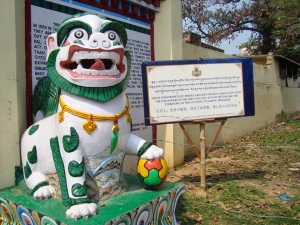 “Gelugpa Monastery. Sign reads: “Those who propitiate Dorje Shugden or Have Association with Followers of Shugden May Not Attend or Explore The Territory of the On Going Teaching Program.”
“Gelugpa Monastery. Sign reads: “Those who propitiate Dorje Shugden or Have Association with Followers of Shugden May Not Attend or Explore The Territory of the On Going Teaching Program.”I could go into the ins and outs of how and why the Dalai Lama has banned the practice of Dorje Shugden for political gain using mickey-mouse reasoning and jingoistic superstitions that anyone with ten minutes of Buddhist education could refute, eg, doing this practice destroys Tibet’s hopes of independence and shortens the Dalai Lama’s life. I have looked into all the Dalai Lama’s speeches and their refutations in detail in the past, as have many others, including wise and learned scholars, Yogis and Buddhist masters; and you can find the debates all over the Internet. But why I and many others are protesting comes down, I think, to something very simple that everyone can understand. We are standing up for the fundamental human right to defend ourselves against slander and to have the freedom to practice whatever religion we choose. Seen from the perspective of compassion, the maze of arcane reasoning and obscure religious history doesn’t seem so complicated. We are simply asking for freedom. It is not really that complicated at all.
What’s going on Words spoken at Trijang Labrang in Ganden Shartse Monastery, 1999. Since then, he has been true to his word. It has gotten worse, a lot worse.
Words spoken at Trijang Labrang in Ganden Shartse Monastery, 1999. Since then, he has been true to his word. It has gotten worse, a lot worse.
In the East, the Dalai Lama is clamping down heavily on religious freedom. In the West, he is publicly slandering a huge number of Buddhists, calling them demon worshippers and cultists, among other things. This Friday, for the first time in history, the Washington National Cathedral, “a spiritual resource for our nation… for people of all faiths and perspectives”, will not open its doors to anyone who makes prayers to the Wisdom Buddha Dorje Shugden. This ban is clearly displayed on the Dalai Lama’s own website, websites of teaching locations during this current tour, and other websites under his jurisdiction around the world. These actions are aimed at destroying a tradition that has brought and could continue to bring deep happiness and mental freedom to millions of people.
Including me. I have been a Kadampa Buddhist for 32 years and it has brought me nothing but benefit. As is often pointed out, you don’t have to be a Buddhist to gain benefit from Buddha’s teachings, they’re common sense for everyone. If you find anything helpful on this blog, all I can say is that any bit of sense on it comes from practicing this tradition of Buddhism in my daily life. This includes making prayers to the Protector Dorje Shugden to help me remove unfavorable conditions (mainly delusions) and gather the necessary inner and outer conditions for me to improve my good qualities and help others. If the Buddhism I practice and share is not really Buddhism, but is spirit worship, a weird sectarian cult, etc, then I don’t know what Buddhism is.
Freedom of thought applies to you too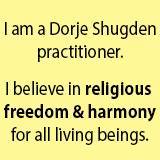
I believe in harmonyTo my fellow Buddhists of any tradition, and to anyone reading this, I am not asking you or anyone else to position yourselves one way or another on it, let alone become anxious or heavy. You don’t have to think about it at all if you don’t want to, of course. Compassion is personal. I am not challenging the Dalai Lama out of grasping, anxiety or aversion, only out of the wish to help and the belief that I can help remedy this situation. My teacher Geshe Kelsang received requests from Dorje Shugden practitioners to help, and, feeling for their plight, developed strong compassion. When I heard and saw what was happening, I prayed and meditated, and I wanted to do something practical too.
Everyone is entitled to their own freedom of thought, this is a fundamental human right, and actually what we are fighting for. As my teacher says, everyone has freedom. Staying happy, harmonious and respectful in our Buddhist communities regardless of whether we wish to work directly to resolve this issue or not is also important – we are after all seeking harmony. Rejecting those with a different opinion is also contradictory to what we want, which is an end to ostracism and persecution.
Also, I don’t believe anything real is going on. This situation is as empty of inherent existence as any other situation, and Buddhists’ main job is still and always will be to remove the main causes of suffering, self-grasping ignorance and its samsaric hallucinations. It might be futile to try to get to “the bottom of all this” – in reality, it is dreamlike appearance like everything else — there is nothing to get to the bottom of. Best to follow wisdom and compassion. The world we normally see does not exist, and that includes this problem.
What is Buddhist tolerance?I am a huge believer in solving problems through meditation and prayer. But those who say Buddhists should sit passively and solve these kinds of problem ONLY through meditation and prayer may be kind of missing the point. Buddhists are not doormats. They are not inert. They don’t just sit around and stare at their navels. Sometimes I think the Western interpretation of Buddhist tolerance and pacifism gives rise to a mistaken understanding that wishy-washy Buddhists are afraid to deal with reality head on, honestly, and as it appears. “I mustn’t do that or suddenly I’ll be seen as unpeaceful or political. I must allow others to abuse me because if I don’t I’m being self-cherishing.” Of course if you have a headache, take a pill. If your car breaks down, fix it. If someone is behaving inappropriately, tell them to stop. This is normal stuff when human beings are living together. Most Buddhists in their day to day lives advocate for others and engage in active compassionate activities. There are some Bodhisattva vows that directly encourage this, such as going to the assistance of those in need, and helping others overcome their bad habits and negative actions.
There are two types of problem requiring two types of solution. For example, if my car breaks down, that is the car’s problem, an outer problem. If I get upset about it, I have a problem now, an inner problem, the only actual problem. The way to solve my problem is by changing my mind through patience, for example. But however patient I am, my car will not miraculously start running again – to solve that outer problem I need to take it to the garage.
Therefore, with a patient heart, I am asking the Dalai Lama (1) to stop lying; and (2) to give religious freedom. That’s all.
The importance of motivationDorje Shugden himself is a manifestation of stainless wisdom that is supreme inner peace, not a manifestation of delusion; and yet he appears in the aspect of supreme, skilful, compassionate activity. Buddha Tara likewise. Not to mention all the wrathful Deities in Buddhism. As Buddhists, we work with our minds, so we ask ourselves not so much, “What do my actions look like” but “What is the mind or motivation behind them?” When I ask myself what is my teacher’s reason for speaking up, for example, I can see clearly that it is because of his deep compassion – and he doesn’t mind if his actions make him unpopular amongst the powers that be. Our freedom of speech and action is informed by compassion and wisdom. When it is informed by delusions, we know it is not really free.
Nothing personalI have to say that the Dalai Lama’s attacks on me feel quite personal — he calls me a demon-worshipper, a non-Buddhist, and any other number of unflattering things, and he won’t let me or any other Dorje Shugden practitioner go anywhere near him in case we somehow pollute him — but to be honest when I protest the Dalai Lama, I don’t feel anything personal about it. I am protesting his speeches and his actions, not his person. I also don’t care about his political position, except insofar as he is using it to effect a religious ban. I don’t care what religion he practices.
“Stop lying” is not the same as saying “We hate you”. It is not personal. It can even be loving, if that is what is motivating it, just as a mother loves her child even when she tells him off for telling big fat porkies.
He can think what he wants
Monks Forced to Vote
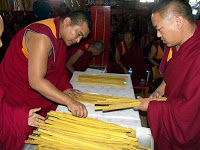 Monks forced to sign saying they will not pray to Dorje Shugden
Monks forced to sign saying they will not pray to Dorje Shugden
There is nothing wrong in the Dalai Lama thinking that Dorje Shugden is a sectarian demon, or whatever it is he thinks – it is the ban and persecution that are wrong. The Dalai Lama does not have a right to repress other people’s rights. The Dalai Lama does have a right to express his opinion … and we have a right to disagree. So if he says such stupid things in public, whoever he is and however popular, I also reserve the right to call him out on that in public, to say “Where is your proof? Why are you slandering us? Please stop.” If the Dalai Lama says he is challenging our views, then he needs to discuss it – but he has never discussed it with anyone, including Geshe Kelsang, who has written several open letters asking him to. The Dalai Lama needs to give good reasons. A bearded monk strangling a villager in a dream is not going to cut it.
Don’t shoot the messengerTo those who say that our calling out the famous face of Buddhism is causing disharmony in the Buddhist world and giving Buddhism a bad name, I reply, “Why are you shooting the messenger?” There is already very serious disharmony in both India and over here in the West, and the reputation and very survival of Buddhism is under grave threat as a result of the Dalai Lama’s speeches and actions. He only needs to give one speech retracting the ban and restoring people’s rights, and the problem is over. We can all get on with our lives and practices in peace and harmony.
Calling out the Dalai Lama is like “shooting Bambi”, as one journalist put it to me in the 1990s, saying that no one would want to be the first to do that. But doesn’t someone have to challenge him if his actions are in direct contradiction to his honeyed words? Was the boy wrong to call out, “But the emperor has no clothes!”?
HarmonyWhen we say to the Dalai Lama, “Justify what you are saying and lift the ban”, we are trying to create harmony, not disharmony. We are standing up for Tibetans who practice the same tradition as us but have zero opportunity to question or demonstrate. Challenging someone is not creating disharmony. If someone for whatever reason is saying things that are not true based on whatever reason, we try to correct that in compassionate ways – and if a public figure is influencing others to take on wrong views, we can challenge that publicly. It is a misunderstanding that to act or take a position against others’ views is somehow disharmonious or unBuddhist or not “right action”.
Buddhist tolerance and debate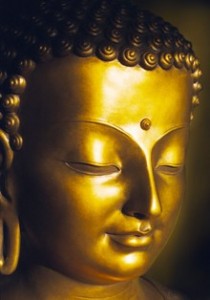 In King of Concentration Sutra, Buddha says:
In King of Concentration Sutra, Buddha says:
If someone generates attachment when hearing this Dharma,
And anger when hearing non-Dharma,
And out of pride destructively refutes,
Later they will experience suffering through the force of their pride.If we are attached to our own ego, we might think we are a better person because of our special view and have aversion for others with other views, in which case we’d be entirely missing the main point of Buddha’s teachings, which is to overcome the three poisons of self-grasping ignorance, attachment and anger.
This quote seems to me the essence of Buddhist tolerance and wisdom, understanding that everyone needs to find their own path, the one that works for them. We test Buddha’s teachings like gold to see if they work for us personally because no one, not even Buddha himself, can force us to change – we have to want to take the medicine ourselves. It doesn’t stop us debating with others – there is a long, rich, history of Buddhist masters debating and converting people to Buddhism that way (for the record, both Tibetans and Westerners have been asking and petitioning to discuss and debate this with the Dalai Lama, but in 6,508 days and counting he hasn’t even agreed to a five-minute meeting with us.) I am not protesting out of attachment to my tradition, or anger that the Dalai Lama doesn’t like my tradition any more (even though he grew up in it). I am not trying to punish or hurt the Dalai Lama. This analogy is more how I feel about it:
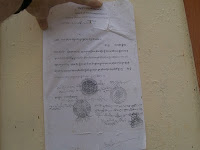 To Devotees of Avalokite?vara
To Devotees of Avalokite?vara
In Camp no. 3, near the mustachioed Amdo’s restaurant, a shop owned by a family of camp 4, they are Shugden worshipers, thus you all are strongly recommended not to walk in or buy anything from this shop.
signed: the group of enemy defeatersIf you were in a burning building, and you were able to hold a fire door open, and someone is standing in front of it saying: “Don’t come through here, it is dangerous, you’ll really regret it”, you’d say “Stop lying, can you let people pass through this door please.” You’re not angry at them; it is not even about them. This is not about the Dalai Lama but about keeping that door open and allowing people to go through. He can go through it or not, or find his own door, but please, we are asking, don’t obstruct other people going through if they want to, they need freedom and choice.
Not only is this not a personal attack, but it is also not contradictory with having love for him, wanting him to come through too, or find his own way, or whatever he can do to stop burning up. This is not being mean to the poor Dalai Lama, or slandering him. That sentimentality is not compassion. Geshe Kelsang once said that protesting the Dalai Lama is loving him.
Or let’s say you’re dispensing some effective medicine that people trust, and another company has some other product and is telling everyone that yours is poison, would you not object: “Hey, a lot of research has gone into this, it has been proven over generations to work, stop lying! Don’t kick people out of their homes, monasteries, health clinics, or communities if they take it! Don’t spit at them! Don’t stop them sending their kids to school!” Etc.
If the Dalai Lama wants to keep victimizing Dorje Shugden practitioners, saying that Dorje Shugden is a spirit, harmful to Tibet, causing him to die early, etc, he has to prove it. But he has provided no evidence for any of it.
Church and state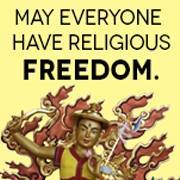
I believe that many of the rights we take for granted today came about because the West allows freedom of speech and people have taken advantage of it. The Dalai Lama is slandering us in public and we are replying to him in public. In America there is a healthy history of standing up for ourselves, as we have been doing these last few weeks and years. We are challenging the lie that has been perpetuated because this tradition was very established and we haven’t done anything wrong. We are not spirit worshippers. We are not Chinese agents trying to harm Tibet or the Dalai Lama. We are not an obscure non-Buddhist sect. We are not the Taliban of Buddhism. These are unsubstantiated lies that have made us unpopular and mistrusted among many people in the West. And meantime we protest also because our fellow practitioners are experiencing even deeper abuses in India.
If you research some of the links on here or elsewhere, you’ll find many speeches and videos of the Dalai Lama calling on people to enforce his ban of these prayers, vilifying practitioners, and explicitly saying, “If they are unhappy with this, tell them it comes directly from me.” There are also multiple videos of members of the government in Tibet in Exile saying that they never disagree with the Dalai Lama, have no doubt about any of his decisions, and that he is not human, he is a Buddha. In this case, the Dalai Lama created this religious persecution, he continues to incite people to enforce it, and he has never tried to stop the violence. One word from him and the violence would stop.
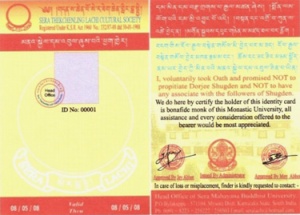
This is why we have a separation of church and state over here – so that all religions can live together without one deciding to boot out all the others and deny them their rights. Unfortunately, there is no such separation in the office of the Dalai Lama. The Dalai Lama preaches tolerance, but in Tibetan society you have to sign to say you are not a Dorje Shugden practitioner or associated with one, otherwise you will lose your job, your income, your friends etc. People are being forced to reject their objects of refuge. Different religions in the USA may gripe at each other, but it would be entirely unacceptable over here to have to carry a card around to prove that you had sworn that you were not a Jew, for example, or associated with one.
What is going on in Uganda? An example of the need for free speech.Switch out some of the words in this news article about Yoweri Museveni suppressing gays in Uganda and you could be talking about what is going on with the Dalai Lama. Eg, “penalty for those convicted of being Dorje Shugden practitioners”, “requires Tibetans to report anyone they suspect of being a Dorje Shugden practitioner”, “the tussle over the ban has drawn attention away from the Dalai Lama’s increasingly autocratic rule”, “local media have made anti-Dorje Shugden sentiment synonymous with patriotism”.
And if Yoweri Museveni came over here to spout anti-gay lies in public, saying gay people are “wrong, all wrong”, etc, (as the Dalai Lama has said about us), would people not stand up in public and say “Give gays in Uganda freedom” and “Stop lying about what it means to be gay”? I think they would. They would not want their freedoms to be eroded through passivity. And would people object to those protestors, “Don’t be so mean to Museveni, you are causing disharmony! And anyway what has it got to do with you what happens to gay people over there, you can be gay over here if you want to …?” I don’t think they would. To me, the two placards held at the peaceful protests, “Stop lying” and “Give religious freedom”, therefore say it all.
In the West people are free to make up their minds for themselves, and not everyone will blindly listen to the Dalai Lama just because he is a famous religious leader. The protests provide a forum where we can say what we have to say, peacefully, with no one rioting or threatening the Dalai Lama, so that people CAN make up their own minds, can inform themselves rather than simply believing what the Dalai Lama is saying because he is famous and we would all like him to be a perfect, pure being. We are raising a red flag and, hopefully, a debate leading to a solution.
Religion, not politics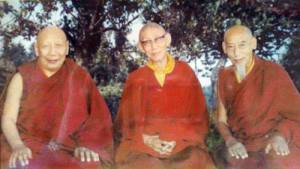 Kyabje Ling Rinpoche, Kyabje Trijang Dorjechang, Kyabje Zong Rinpoche. The Dalai Lama’s teachers and Dorje Shugden practitioners.
Kyabje Ling Rinpoche, Kyabje Trijang Dorjechang, Kyabje Zong Rinpoche. The Dalai Lama’s teachers and Dorje Shugden practitioners.I think another mistaken view is that any verbal or publicly physical positions are political, in which case you’d have to say that Buddha was a politician and not a spiritual teacher because he took a position. Lying is wrong. Killing is wrong. Harming others is wrong. These actions are wrong. Buddha was not seeking power. Many Buddhist masters have challenged other schools and teachers who have taught wrong views; there is a rich Buddhist history of that. During the so-called Buddhist “golden age”, they would walk directly and fearlessly into those places, their motivation not to gain worldly power but to keep the door to liberation open for that time and place. Tilopa had already sorted out his own problems, for example, and attained enlightenment, so he debated not for his liberation and certainly not for power as he remained a mendicant throughout his life. His purpose was simply Heruka’s compassion to keep the doors to liberation open for the people at that time.
So if someone says Buddha’s teachings are wrong, or Trijang Rinpoche’s teachings are wrong, it seems like partially my responsibility as a practitioner to keep those doors to liberation within the Kadampa lineage open for the people of this world. I am not saying that there are no other doors to liberation, I am not saying that, but this is MY tradition, it is special to me, and I want to share that with other people. And if someone of great influence is telling lies about it, saying it is the doorway to suffering, then it is very normal to respond, “No, actually, you’re wrong. You are lying”. To encourage a debate on that. And that is all I am doing. So where is the politics in that? There is no politics in that.
How can the Dalai Lama and his actions be such a threat to religious freedom for Kadampa practitioners in the West, especially in the U.S.A.?
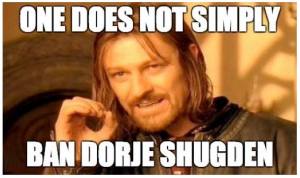
Everyone in the media calls the Dalai Lama the leader of the Tibetans and also the Pope-like leader of Buddhism, and he uses this influence within the Buddhist world, claiming to be a representative. “I know Je Tsongkhapa’s tradition,” as he said in a recent encounter with a protesting nun, “and this is wrong”. It is very common for people to come to Kadampa centers, for example, and ask “What does the Dalai Lama think of you?”, even though he is not our religious leader. I believe that due to his position the Dalai Lama has powerful speech and the ability to seriously harm if not destroy the New Kadampa Tradition and Je Tsongkhapa’s pure lineage. For me, this is the ideal moment to try and protect it.
Right now we have the freedom to practice, but if we don’t challenge those views in a democracy, where there is freedom of speech, then those are the views that get heard, and become influential, it is as simple as that; and finally they are the views that carry. The alternative is to use our freedom of speech to maintain a healthy challenge and a healthy debate so that the power of that speech becomes mixed with the power of debate and uncertainty, which is opposing fanaticism, not creating it. The whole history of feminism, gay rights, civil rights, etc, is all about challenging those views so that people can raise their consciousness about these things. “Hang on a second, perhaps black people are not in fact inferior, and should have the same freedoms as white people.”
What would have happened if no one had ever chained themselves to railings or ridden at the front of a bus, or if MLK or Gandhi had never stood up? And so on. I have a dream of two different peoples living together. Let us do what we do and you do what you do, and don’t lie about us.
“Oh it’ll just go away on its own”, some people say, but why? There are still racists and homophobes over in the West, but the point is they are challenged daily, and for as long as that happens the rights of vulnerable groups are being protected.
People who protest the status quo don’t necessarily look cool at the time – for example feminists were labelled hysterical, extreme, militant, unwomanly, etc, but today I am very much enjoying their kindness. We Kadampas are often labelled “unBuddhist”, uncool, this is not “right action”. If protesting the Dalai Lama doesn’t make me look cool, but helps lift the ban, I don’t mind looking uncool.
“And who are we as Kadampas to take the moral high ground when our own tradition is not completely free from stain (not the teachings of course, but the behavior of certain practitioners).”
Someone asked me this question the other day. But I think it is illogical. It’s like saying, who are you to argue that Yoweri Museveni is wrong and abusing human rights in Uganda when you still get angry with your friends or people in your group might be shoplifters? Although I can be wrong about other things and make mistakes in my life, this doesn’t mean what the Dalai Lama is doing is not wrong – it is still wrong. I need to improve and remove my own faults – that is still my main job, of course. But this argument above is like saying, “Why try and protect that shelter dog when you can’t protect yourself yet?” or “If you have any delusions, keep your mouth shut.” We are not being holier than thou. We are just trying to keep the door open.
Most of our lives, of course, hopefully 100%, are spent in trying to practice this tradition ourselves or there is no meaning of the fraction of time we spend in protests.
Thank you for reading this, I know it was long! Your turn now. Comments welcome.
http://kadampalife.org/2014/03/05/dalai-lama-please-give-religious-freedom/